Best Futures Brokers for Small Accounts
When trading futures with a small account, the choice of broker can make or break your success. Key factors like low account minimums, competitive commission rates, and flexible margin requirements are crucial. Additionally, a reliable platform with essential tools like real-time data, advanced charting, and mobile access can help you trade effectively without high costs.
This guide reviews seven brokers - NinjaTrader, AMP Futures, Optimus Futures, TradeStation, Interactive Brokers, Webull, and E*TRADE - to help you find the best fit for your needs. Here's a quick breakdown:
- NinjaTrader: Low $400 minimum, $0.59 per side, advanced charting tools.
- AMP Futures: $500 minimum, $2.38 per round turn, multiple platform options.
- Optimus Futures: $500 minimum, $0.25 per side for micros, zero platform fees with advanced DOM and order flow tools included.
- TradeStation: High $5,000 minimum, advanced tools for strategy developers.
- Interactive Brokers: Tiered pricing, global access, powerful trading tools.
- Webull: $2,000 minimum, simple mobile-first platform, $2.50 per contract.
- E*TRADE: Low minimum, user-friendly platform, solid customer support.
Quick Comparison
| Broker | Account Minimum | Commission Structure | Best For |
|---|---|---|---|
| NinjaTrader | $400 | $0.59 per side | Advanced charting traders |
| AMP Futures | $500 | $2.38 per round turn | Cost-conscious traders |
| Optimus Futures | $500 | $2.38 per round turn | Cost-conscious traders |
| TradeStation | $5,000 | Tiered pricing | Strategy developers |
| Interactive Brokers | Varies | Tiered pricing | International traders |
| Webull | $2,000 | $2.50 per contract | Mobile-first beginners |
| E*TRADE | Low | Per-contract + fees | Balanced platform seekers |
Each broker has strengths tailored to different trading styles and budgets. Whether you're looking for low fees, advanced tools, or mobile accessibility, this guide will help you choose the right broker for your small account.
The @futuresfanatic 's Favorite Futures Brokers For Beginners
1. NinjaTrader
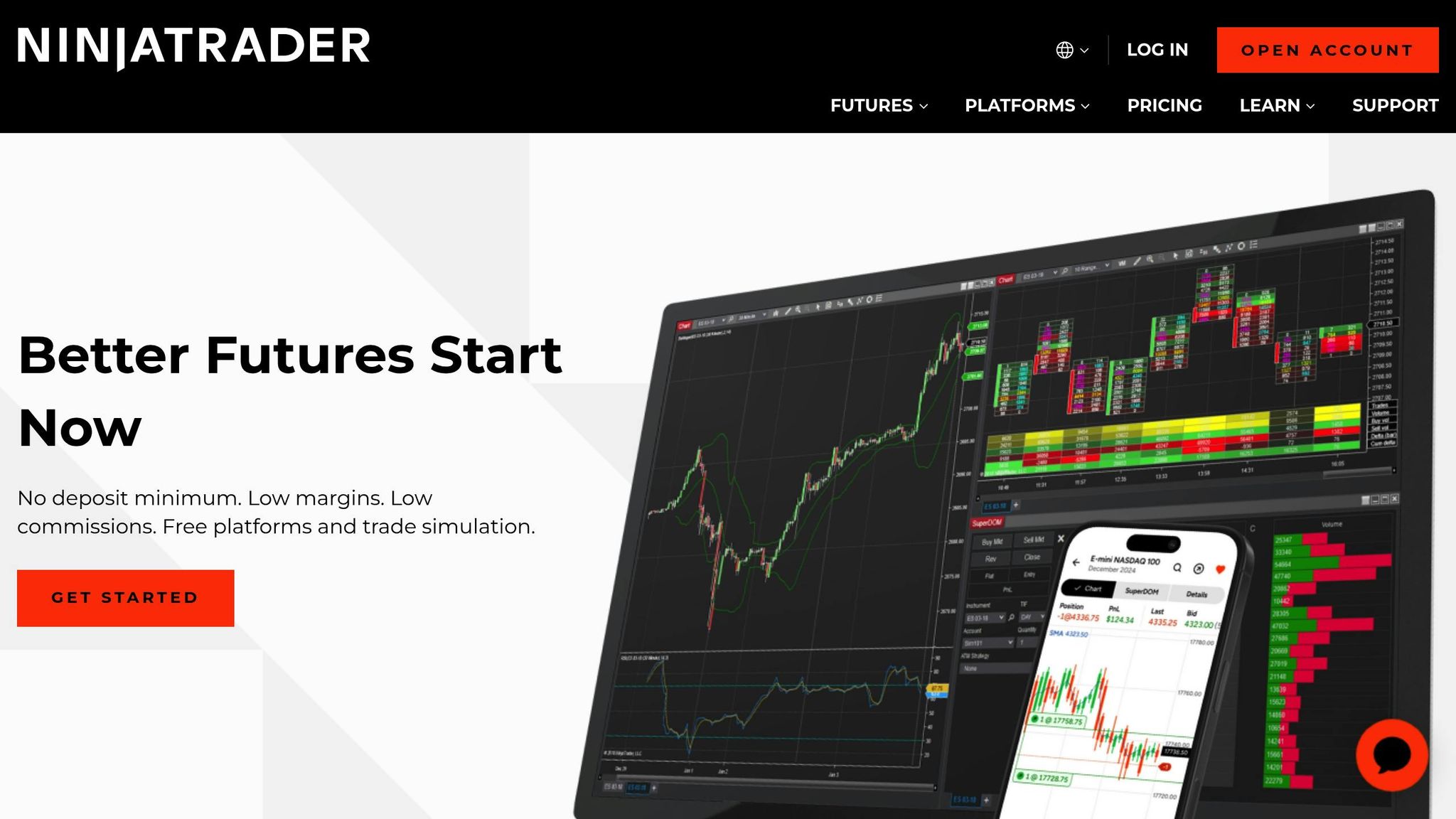
NinjaTrader is a broker that offers a combination of brokerage services and a powerful trading platform, specifically designed for futures traders. Here’s a breakdown of its key features, including account requirements, pricing, platform tools, and support options.
Account Minimums
To open a futures trading account with NinjaTrader, you’ll need a minimum deposit of $400. Once your account is active, there are no additional minimum balance requirements, giving you the freedom to manage your funds as you see fit.
Commission Structure
When it comes to fees, NinjaTrader keeps things straightforward for small-account traders. Futures contracts are priced at $0.59 per side per contract, which means a round-trip trade will cost you $1.18. This pricing applies to all traders, regardless of account size or trading volume.
For those who trade frequently, there’s good news: NinjaTrader offers volume discounts. If you trade over 1,000 contracts in a month, your commission can drop to as low as $0.29 per side.
Platform Features
The NinjaTrader platform is packed with tools to support futures traders. It offers advanced charting capabilities with over 100 built-in technical indicators, customizable workspaces, and the ability to automate trades using NinjaScript. For basic charting, the platform is free, but a full-featured version is available for $60 per month. This fee is waived if you make 40 or more trades in a month.
One standout feature is the market replay tool, which allows you to practice trading using historical data. For real-time trading, data feeds are available for major exchanges. For example, CME Group data costs $85 per month, though this fee may be reduced or waived depending on your trading activity.
Customer Support
NinjaTrader offers multiple support options, including phone, email, and live chat during market hours. Their educational resources are extensive, featuring webinars, video tutorials, and a detailed help center that covers both platform usage and futures trading essentials.
Additionally, NinjaTrader fosters a strong user community through forums where traders exchange strategies, share custom indicators, and discuss platform tips. They also provide free training sessions to help new users get up to speed with the platform’s advanced features.
2. AMP Futures
AMP Futures is known as a discount futures broker, catering to active traders and those with smaller accounts. The company prioritizes low-cost trading while offering access to a variety of trading platforms.
Account Minimums
To open a futures trading account with AMP Futures, you’ll need a minimum deposit of $500. This requirement is similar to NinjaTrader, making it a budget-friendly option for traders starting out or managing smaller accounts. Unlike some brokers, AMP Futures doesn’t enforce ongoing minimum balance requirements, so you can trade with whatever funds remain after your initial deposit.
Commission Structure
The commission setup at AMP Futures is designed to appeal to both high-volume and smaller-scale traders. Standard commissions are $2.38 per round turn, but for those trading in larger volumes, rates can drop to as low as $0.85 per round turn. The broker also offers tiered discounts based on monthly contract volume, giving traders the opportunity to reduce costs further as their trading activity increases. This structure helps keep trading expenses manageable, even for those with smaller accounts.
Margin Requirements
AMP Futures provides reduced intraday margins, which are much lower than overnight margin requirements. For instance, while the overnight margin for an E-mini S&P 500 contract might be $13,200, the intraday margin can go as low as $500 per contract. This feature is particularly helpful for traders with smaller accounts, as it allows them to maximize buying power during active trading periods.
For experienced traders, AMP Futures also offers the flexibility to request custom margin rates, tailoring the experience to individual needs.
Platform Features
One of AMP Futures’ strengths is its access to a range of third-party platforms, including NinjaTrader, TradingView, Sierra Chart, and MultiCharts. This variety allows traders to pick a platform that best suits their trading approach and analytical preferences.
Many of these platforms are available without extra charges, aside from standard data fees. TradingView, for example, is a favorite among newer traders thanks to its intuitive design and powerful charting tools. For those seeking advanced features, Sierra Chart provides extensive customization and sophisticated order management options.
Data fees are another consideration. CME Group data costs around $85 per month, though discounts may apply based on trading volume. AMP Futures also offers data packages that can help lower costs for traders needing access to multiple markets.
Customer Support
Customer support is available by phone and email during market hours, with response times typically within a few hours. While the support team is well-versed in account management and platform setup, AMP Futures doesn’t heavily focus on educational resources. This aligns with their goal of serving experienced, cost-conscious traders who prioritize execution and low fees over comprehensive learning tools.
3. Optimus Futures
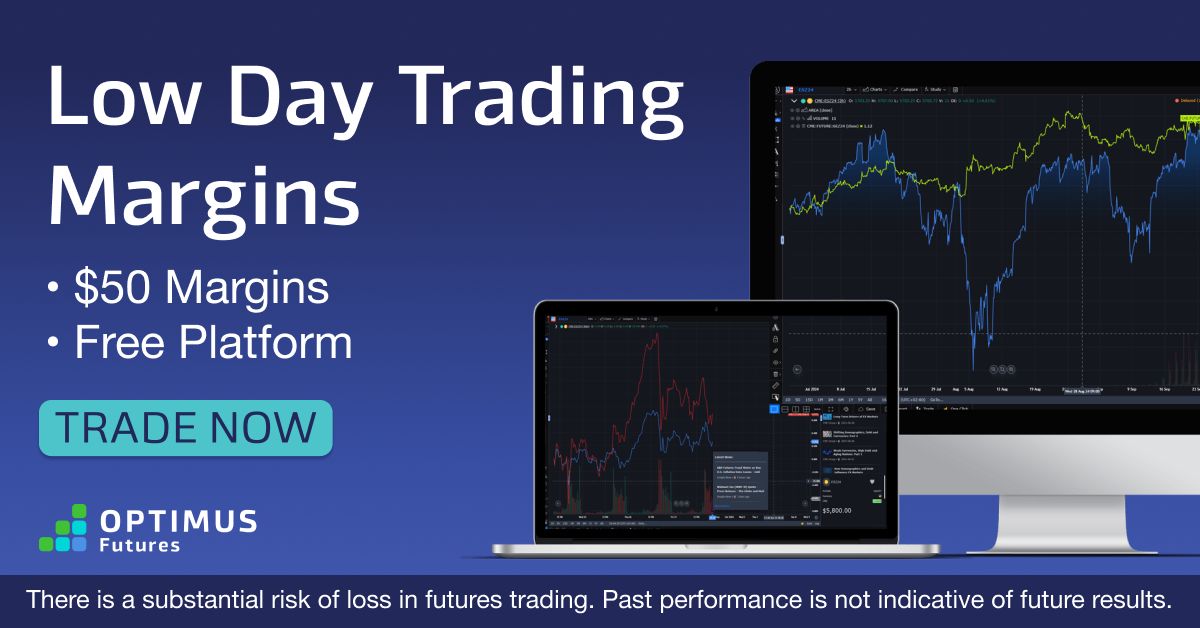 Optimus Futures stands out for small account traders by eliminating platform fees entirely while providing access to professional-grade trading tools. Their zero-fee platform model means more of your limited capital stays in your account rather than going toward monthly subscriptions.
Optimus Futures stands out for small account traders by eliminating platform fees entirely while providing access to professional-grade trading tools. Their zero-fee platform model means more of your limited capital stays in your account rather than going toward monthly subscriptions.
Why It's Great for Small Accounts
The combination of no minimum deposit requirement, competitive intraday margins, and zero platform fees makes Optimus accessible for traders starting with $500 (micros) to $2,000 (minis). Optimus provides institutional-quality tools to all account sizes, ensuring small accounts have access to the same professional platforms and order flow analysis features. Micro E-mini contracts requiring just $50 intraday margin allow for proper risk management even with limited capital.
Account Minimums
Optimus requires a minimum deposit of only $500 to open an account. There are no monthly maintenance fees, no inactivity charges, and no account minimums to maintain platform access. This flexibility lets you start small and scale up as your account grows.
NEVER MISS A TRADE
Your algos run 24/7
even while you sleep.
99.999% uptime • Chicago, New York & London data centers • From $59.99/mo
Commission Structure
Commission starts at $0.25 per side with volume discounts available as your trading activity increases. While not the absolute lowest per-contract rate, the zero platform fees often result in lower total monthly costs compared to discount brokers that charge $50-$100/month for professional platforms. For small accounts trading less frequently, this structure keeps more capital working in your account.
Platform Features
Optimus provides a complete platform suite at zero cost: Optimus Flow (desktop), Optimus Web (browser-based), and Optimus Mobile (iOS/Android apps). Small account traders get access to advanced DOM trading, footprint charts, volume profile analysis, and order flow tools that typically cost extra on 3rd party platforms – saving precious capital that can stay in your trading account instead.
The multi-platform access allows you to monitor positions and manage trades from anywhere, whether at your desk, traveling, or away from your computer. Beyond the Optimus suite, you can connect to 20+ professional platforms including Sierra Chart, TradingView, and Bookmap – all with the same seamless brokerage integration.
Educational Resources
Optimus provides educational content focused on trading psychology, risk management, and skill development – critical topics for small account survival and growth. Their educational approach emphasizes proper position sizing and money management rather than just platform tutorials, helping new traders build sustainable habits from the start.
4. TradeStation
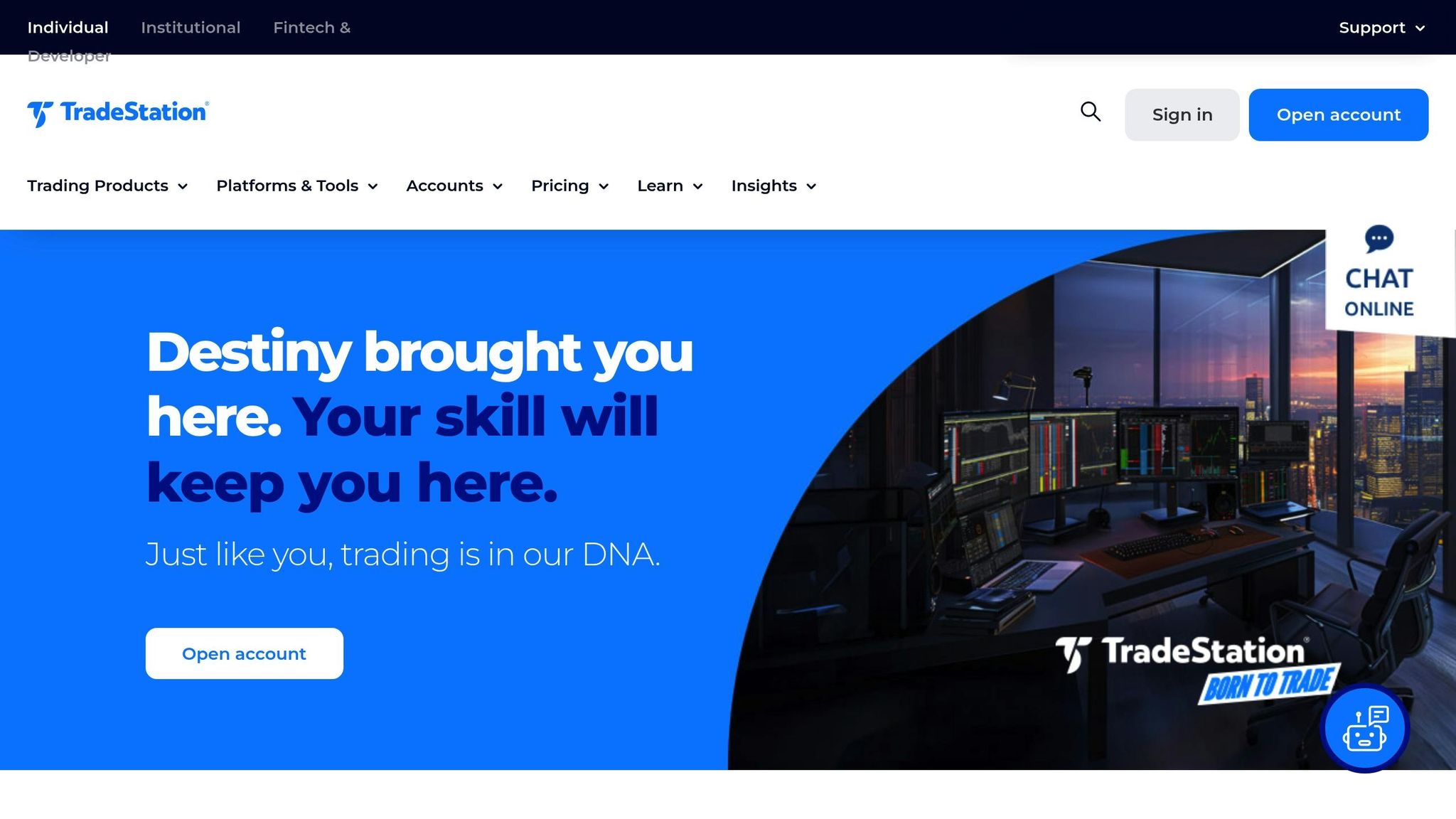
TradeStation provides a range of advanced tools tailored for both experienced and aspiring traders. While its features are designed with professional trading in mind, it's particularly well-suited for those with larger capital and a desire for high-level trading tools.
Account Minimums
When it comes to account requirements, TradeStation sets the bar higher than many competitors. To open a futures trading account, you'll need a minimum deposit of $5,000. This higher threshold can make it challenging for beginners or traders with limited funds to get started. However, it's worth noting that opening a general TradeStation account doesn’t require a minimum deposit; the $5,000 applies specifically to futures accounts.
Platform Features
TradeStation delivers a robust lineup of trading platforms across Desktop, Web, Mobile, and FuturesPlus - all available without additional fees. These platforms come equipped with comprehensive charting tools, offering customizable options and a wide array of technical indicators. For those looking to sharpen their skills, TradeStation includes a free trading simulator, while its mobile platform ensures you can monitor and manage trades wherever you are.
5. Interactive Brokers
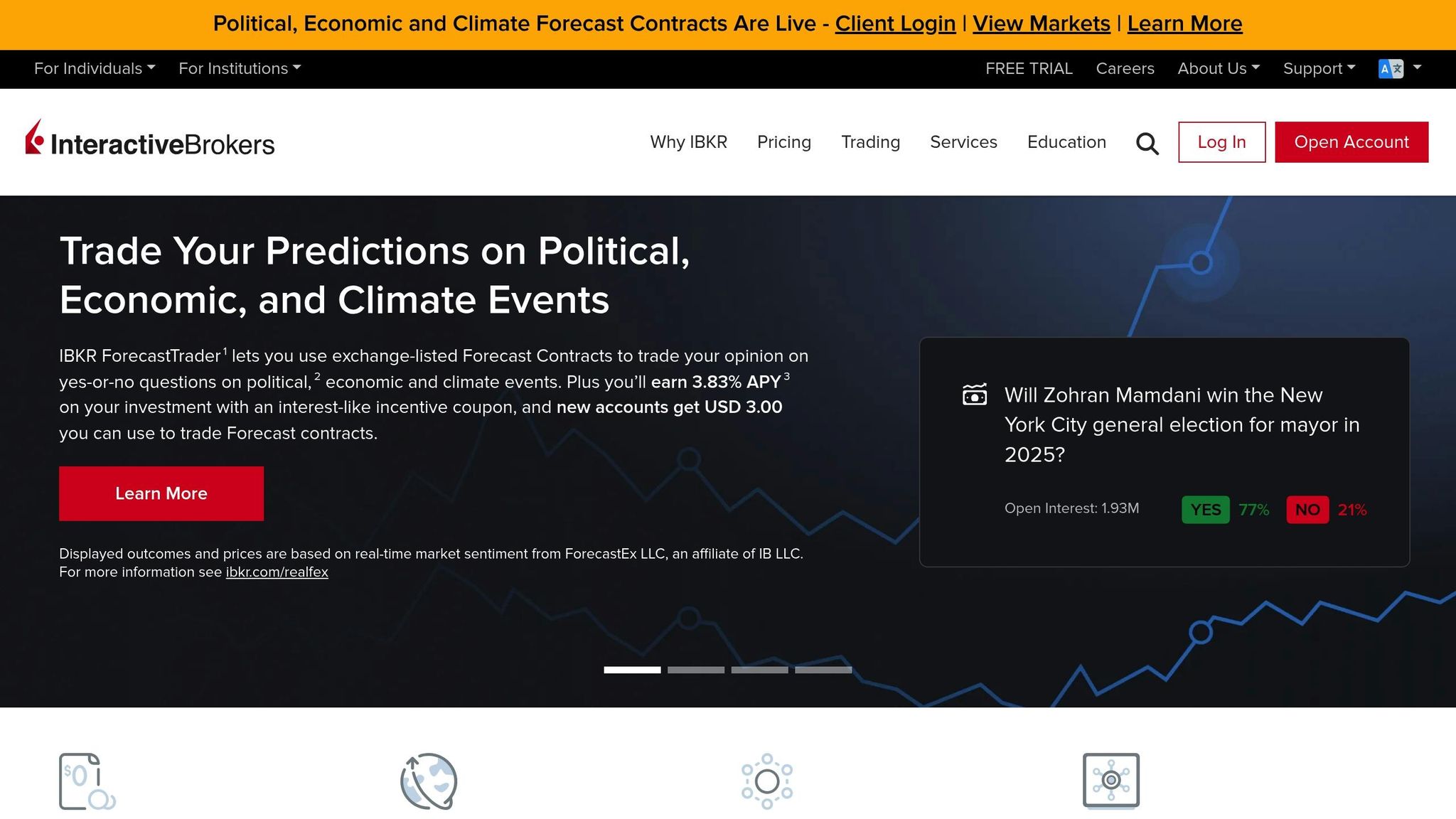
Interactive Brokers caters to both professional traders and everyday investors by combining advanced technology with extensive market access. It also provides a comprehensive range of trading tools, making it a popular choice for futures trading.
Account Minimums
Opening a futures trading account with Interactive Brokers requires an initial deposit that aligns with the platform's advanced features. However, there are no ongoing maintenance fees, helping traders manage costs more effectively.
Commission Structure
Interactive Brokers emphasizes cost transparency with its tiered pricing model for futures contracts. This approach offers discounted commissions based on trading volume, while clearly outlining exchange and regulatory fees on top of the base commission. The straightforward fee breakdown ensures traders know exactly where their money is going.
Platform Features
Interactive Brokers shines with its powerful tools and platforms. The Trader Workstation (TWS) stands out, offering advanced charting, risk management tools, and algorithmic trading capabilities. Whether you're using TWS or the simplified Client Portal, you can access a wide range of markets and trading tools, whether you're at your desk or on the move.
Customer Support and Educational Resources
Interactive Brokers provides customer support via phone, live chat, and email through regional teams during market hours. For those looking to sharpen their skills, the broker offers a variety of educational resources, including webinars, tutorials, and structured training programs, to help traders at all levels navigate the markets with confidence.
6. Webull
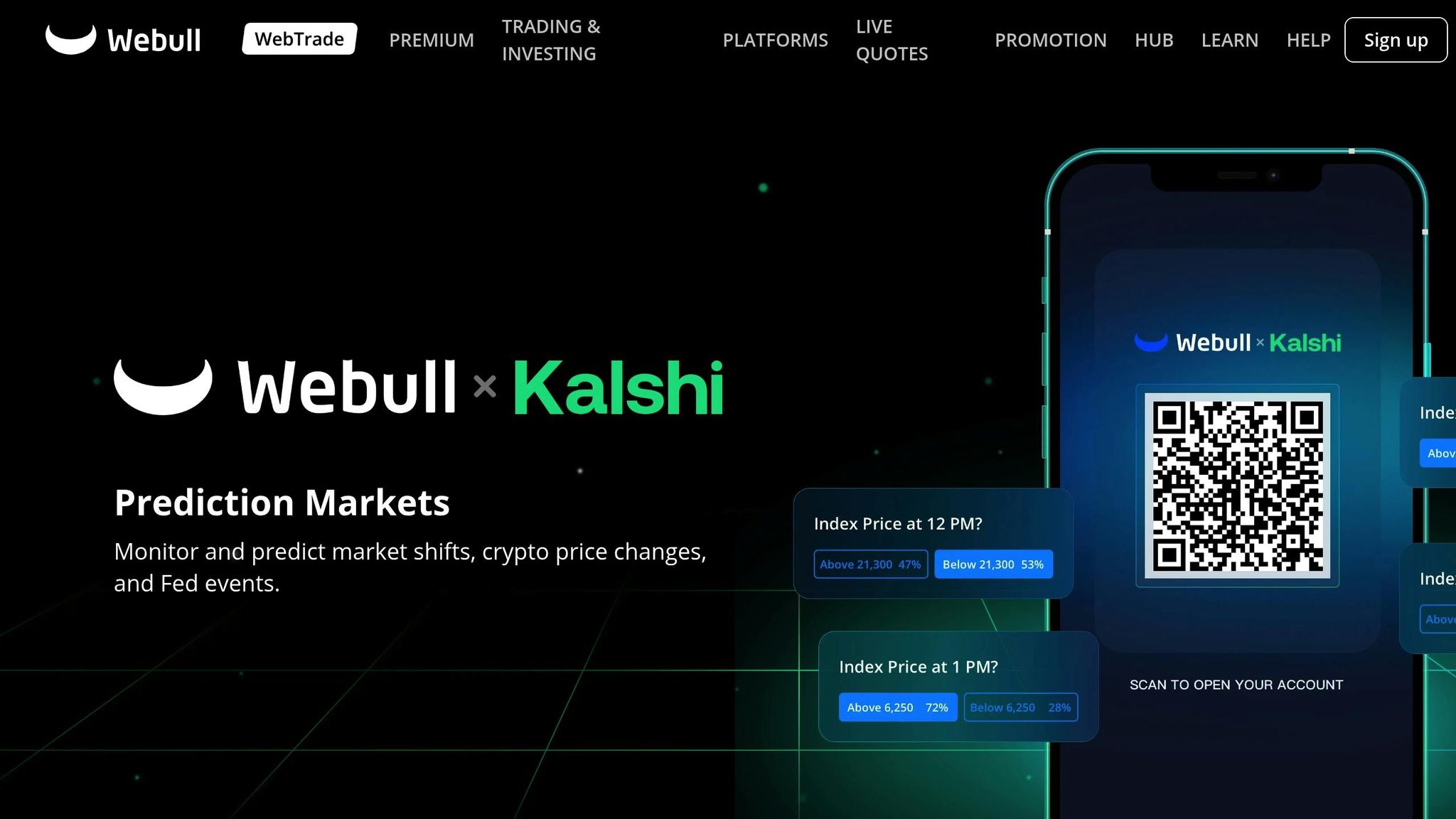
Webull makes futures trading accessible through its modern mobile and desktop apps. The platform aims to provide affordable trading options while offering a range of tools to support traders at different levels of experience.
Account Minimums
To open a futures trading account with Webull, you'll need a minimum deposit of $2,000. While this is a reasonable entry point for many, it’s worth noting that some competitors cater to smaller accounts with lower minimums. On the plus side, Webull doesn’t charge any account maintenance fees, which helps keep ongoing costs manageable once you’ve met the initial deposit requirement.
Commission Structure
Webull charges a $2.50 commission per contract for futures trades, along with standard exchange and regulatory fees. This straightforward pricing structure works well for traders who prefer simplicity, though it doesn’t include volume-based discounts that might appeal to high-frequency traders.
Platform Features
The Webull desktop platform offers advanced charting tools, featuring over 50 technical indicators, real-time market data, and layouts that you can customize to fit your trading style. These features are also available on the mobile app, giving you the flexibility to track your positions and make trades wherever you are.
One standout feature is paper trading, which lets new traders practice in a risk-free environment. This is especially useful for those with smaller accounts who want to hone their skills before committing real money to live trades.
Customer Support
Webull provides customer support through live chat, email, and phone, with extended hours that cover most trading sessions. Their team can assist with account-related questions and technical issues. Additionally, Webull offers an online help center filled with articles and tutorials to guide users through trading basics and platform navigation.
7. E*TRADE
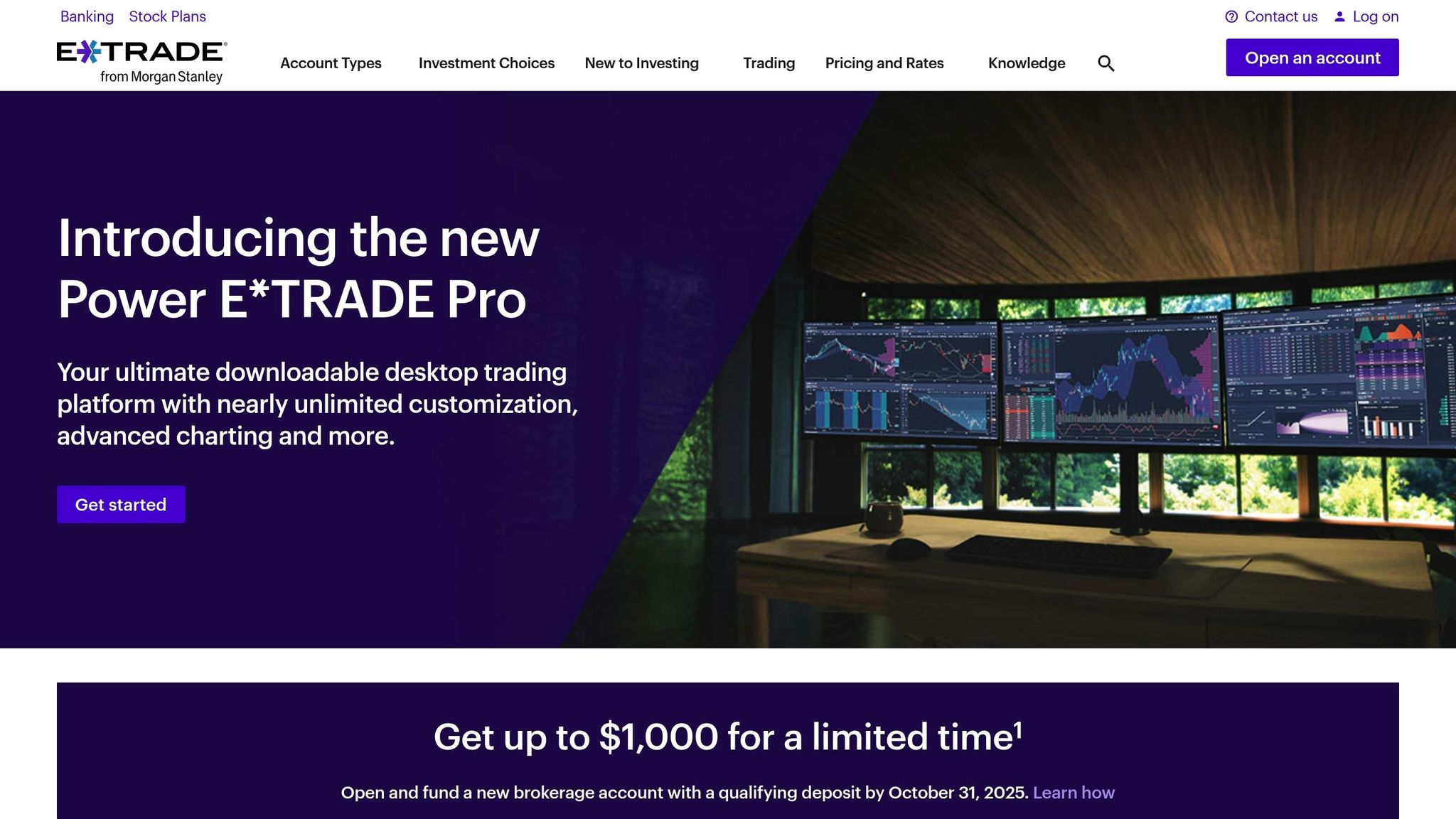
E*TRADE combines professional-grade tools with an easy-to-navigate interface, making it a solid choice for small-account futures traders. Here’s a closer look at what it offers in terms of account requirements, fees, platform capabilities, and customer support.
Account Minimums
E*TRADE keeps things simple with low minimum deposits required to start trading futures. Plus, there are no monthly maintenance fees, which is great for traders looking to keep costs down.
Commission Structure
STOP LOSING TO LATENCY
Execute faster than
your competition.
Sub-millisecond execution • Direct exchange connectivity • From $59.99/mo
The commission setup is straightforward: E*TRADE charges a per-contract fee, along with standard exchange and regulatory fees. This transparent pricing makes it easier to calculate your trading costs.
Platform Features
E*TRADE's platform is packed with features like real-time data, powerful charting tools, and advanced order options such as bracket orders and trailing stops. You can also customize watchlists to track your favorite contracts. The mobile app brings these same tools to your pocket, and if you want to experiment with strategies, there’s a practice trading option available.
Customer Support
Need help? E*TRADE has you covered with phone support, live chat, and secure messaging. Their online help center is also a valuable resource, offering guidance on both basic and advanced aspects of futures trading.
Broker Comparison: Pros and Cons
After diving into the specifics of each broker, let’s see how they compare for small account traders. This breakdown highlights their strengths and weaknesses, helping you decide which one fits your trading style and needs.
| Broker | Account Minimum | Commission Structure | Platform Access | Customer Support | Best For |
|---|---|---|---|---|---|
| NinjaTrader | $400 | $0.59 per side per contract | Desktop, web, mobile | Phone, email, chat | Advanced charting enthusiasts |
| AMP Futures | $500 | $2.38 per round turn | Multiple platforms | Phone, email | Cost-conscious traders |
| Optimus Futures | $500 | $0.25 per side (micros) | Desktop, web, mobile | Phone, email, chat | Small accounts seeking pro tools |
| TradeStation | $5,000 | Tiered pricing | Desktop, web, mobile | Phone, chat, email | Strategy developers |
| Interactive Brokers | Varies | Tiered pricing | Desktop, web, mobile | Phone, chat, tickets | International traders |
| Webull | $2,000 | $2.50 per contract | Mobile-first, web | In-app chat, email | Mobile-focused beginners |
| E*TRADE | Low minimum | Per-contract + exchange fees | Desktop, web, mobile | Phone, chat, messaging | Well-rounded trading |
NinjaTrader stands out for its professional-grade charting tools, making it a go-to for traders who rely heavily on technical analysis. However, its advanced features can feel overwhelming for those new to trading.
AMP Futures appeals to budget-conscious traders, offering a low $500 account minimum and access to multiple third-party platforms. The downside? You’ll need to navigate their list of approved platforms, as they don’t offer an all-in-one solution.
Optimus Futures is ideal for small account traders who want professional-grade tools without monthly platform fees eating into limited capital. The $500 minimum and $50 micro margins make it accessible, while the included Optimus Flow platform provides advanced DOM, footprint charts, and order flow analysis at no extra cost. Traders who would otherwise pay $50-$150/month for similar tools elsewhere benefit most from this zero-fee model.
On the other hand, TradeStation caters to strategy-focused traders who want to backtest and automate their trades. Its built-in coding environment is a major plus, but casual traders may find the $5,000 minimum and extra features unnecessary.
For those looking for global access, Interactive Brokers delivers with competitive tiered pricing and a broad range of markets. That said, its steep learning curve and complex interface might deter beginners.
Webull focuses on simplicity and mobile accessibility, making it a favorite among beginners familiar with stock trading apps. However, it lacks the advanced tools and features seen in desktop-heavy platforms.
Lastly, E*TRADE offers a balanced option with reliable tools, transparent pricing, and solid customer support. While it doesn’t dominate in any one area, it avoids major pitfalls, making it a dependable choice for most traders.
Key Takeaways
- Commission Rates: These vary widely, reflecting each broker's target audience. NinjaTrader, AMP Futures, and Optimus Futures shine for low-cost trading, while Webull and TradeStation cater to different priorities.
- Platform Accessibility: Mobile-first traders often lean toward Webull, while desktop power users prefer NinjaTrader or TradeStation. Interactive Brokers and E*TRADE offer consistent performance across devices.
- Customer Support: E*TRADE and TradeStation are often praised for their responsiveness. Interactive Brokers, while offering detailed technical support, might feel less approachable for beginners.
Ultimately, the best broker for you depends on your trading style and priorities. If you’re a day trader focused on technical analysis, NinjaTrader might be your pick. Budget-conscious traders may lean toward AMP Futures, while mobile-focused beginners often favor Webull. For international access, Interactive Brokers is a strong choice. Take your trading goals and account size into account to find the broker that aligns with your needs.
Final Recommendations
Choosing the best futures broker for your small account is all about aligning your trading style with low costs and essential features. Based on our analysis, here are some standout options tailored to different types of traders:
- Technical analysis enthusiasts: NinjaTrader is a go-to choice. Known for its powerful charting tools and in-depth technical analysis capabilities, it’s perfect for traders who rely heavily on market insights.
- Budget-conscious traders: If keeping costs down is your priority, AMP Futures offers low trading fees, making it an affordable entry point into futures trading.
- Day traders prioritizing capital efficiency: Optimus Futures combines low intraday margins ($50 for micros, $500 for standard E-minis) with zero platform fees, making it ideal for active traders who need to maximize buying power while accessing professional-grade tools like advanced DOM, footprint charts, and order flow analysis – all included at no cost through their Optimus Flow, Web and Mobile platforms.
- Mobile-first traders and beginners: Webull shines with its intuitive mobile platform, making it ideal for those new to trading or who prefer trading on the go.
- Strategy developers and active traders: TradeStation stands out with its advanced coding environment and comprehensive backtesting features, catering to traders focused on creating and automating sophisticated strategies.
- International market access seekers: Interactive Brokers offers competitive tiered pricing and access to global markets, making it a strong choice for experienced traders looking to expand their reach.
- Balanced platform seekers: E*TRADE provides a well-rounded experience with transparent pricing, solid customer support, and educational resources - great for traders seeking a versatile platform.
Once you’ve chosen your broker, prioritize risk management and ensure your trading technology is up to par.
Key Considerations for Small Account Success
Beyond picking a broker, managing risk and understanding margin requirements are critical for small account traders:
- Start with micro or mini futures contracts, which allow for more precise risk management.
- Use demo accounts offered by brokers to practice without financial risk.
- Keep a close eye on margin requirements, especially the difference between reduced day trading margins and higher overnight margins.
Enhancing Your Trading Performance
In the fast-moving world of futures trading, having reliable technology is just as important as choosing the right broker. Execution speed and platform stability can make or break your trades.
For consistent performance, consider using a dedicated VPS (Virtual Private Server). Services like QuantVPS are tailored for platforms like NinjaTrader and TradeStation, offering ultra-low latency (0-1ms) and 100% uptime. Their VPS Lite plan ensures uninterrupted, reliable trade execution.
FAQs
What should I look for in a futures broker if I have a small trading account?
When choosing a futures broker for a small account, it's essential to focus on low account minimums, reasonable commission rates, and affordable margin requirements. These elements help you stretch your trading capital and keep expenses under control, which is especially important when starting with limited funds.
Equally important is selecting a broker that provides a dependable, easy-to-use trading platform. Make sure they offer access to the futures markets you're interested in and have stable technology to ensure smooth, uninterrupted trading. By prioritizing cost-efficiency and practical tools, you can create a solid foundation for trading success, even with a smaller account.
How do commissions and margin requirements affect trading costs for small accounts?
Commissions and margin requirements are key factors in managing trading costs for smaller accounts. Lower commissions make it easier to keep expenses under control, allowing traders to place more trades without cutting too deeply into their profits. This is particularly crucial for active traders who rely on keeping costs low to maintain profitability.
Margin requirements, meanwhile, set the minimum amount of funds needed to open or hold a trading position. While leverage can boost potential profits, it also magnifies risks, including the chance of losses or margin calls if your account balance falls too much. For traders with smaller accounts, higher margin requirements can limit flexibility and raise the likelihood of forced liquidations. Opting for a broker that offers competitive commissions and manageable margin requirements can help small account traders better control their capital and trade with greater confidence.
What is the best broker for beginners focused on mobile trading?
For those just getting started and focusing on trading via their phones, Webull is a standout option. The platform's easy-to-use mobile app, clear pricing structure, and paper trading capabilities make it particularly attractive to beginners and traders with smaller accounts. Webull takes the complexity out of trading while still offering the essential tools needed to build skills and confidence.
While platforms like NinjaTrader and TradingView also deliver powerful features and smooth interfaces, Webull shines with its mobile-first approach tailored to beginners. It’s a great choice for anyone wanting to trade on the go without feeling overwhelmed.
When choosing a futures broker for a small account, it's essential to focus on low account minimums, reasonable commission rates, and affordable margin requirements. These elements help you stretch your trading capital and keep expenses under control, which is especially important when starting with limited funds.
Equally important is selecting a broker that provides a dependable, easy-to-use trading platform. Make sure they offer access to the futures markets you're interested in and have stable technology to ensure smooth, uninterrupted trading. By prioritizing cost-efficiency and practical tools, you can create a solid foundation for trading success, even with a smaller account.
Commissions and margin requirements are key factors in managing trading costs for smaller accounts. Lower commissions make it easier to keep expenses under control, allowing traders to place more trades without cutting too deeply into their profits. This is particularly crucial for active traders who rely on keeping costs low to maintain profitability.
Margin requirements, meanwhile, set the minimum amount of funds needed to open or hold a trading position. While leverage can boost potential profits, it also magnifies risks, including the chance of losses or margin calls if your account balance falls too much. For traders with smaller accounts, higher margin requirements can limit flexibility and raise the likelihood of forced liquidations. Opting for a broker that offers competitive commissions and manageable margin requirements can help small account traders better control their capital and trade with greater confidence.
For those just getting started and focusing on trading via their phones, Webull is a standout option. The platform's easy-to-use mobile app, clear pricing structure, and paper trading capabilities make it particularly attractive to beginners and traders with smaller accounts. Webull takes the complexity out of trading while still offering the essential tools needed to build skills and confidence.
While platforms like NinjaTrader and TradingView also deliver powerful features and smooth interfaces, Webull shines with its mobile-first approach tailored to beginners. It’s a great choice for anyone wanting to trade on the go without feeling overwhelmed.
"}}]}




